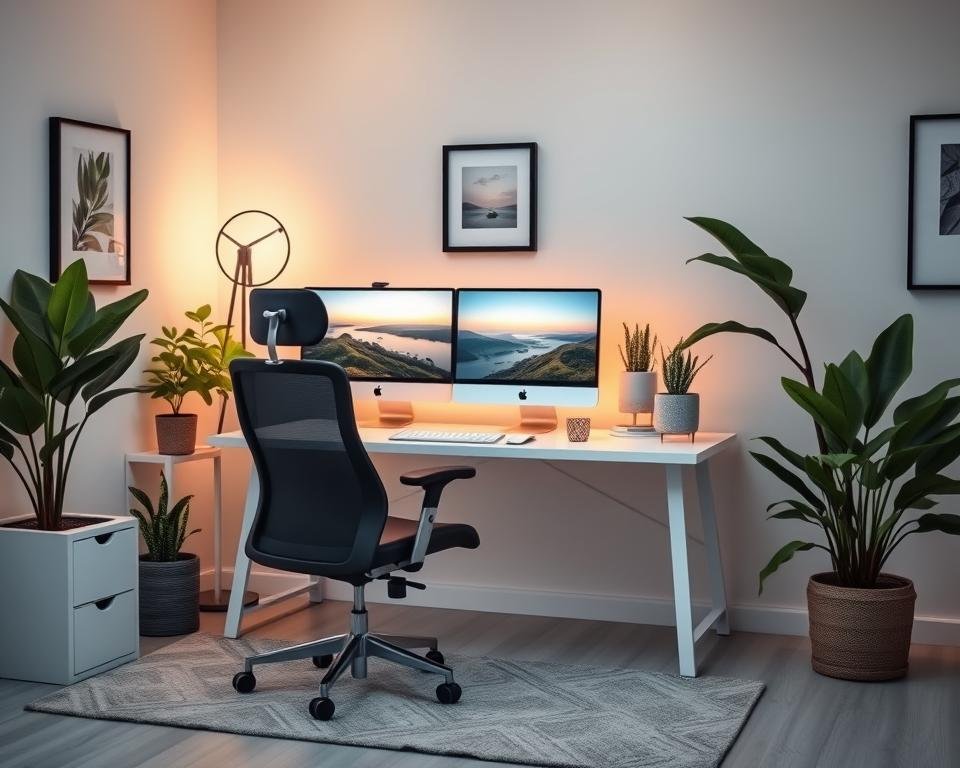Imagine your first day of remote work. You might have gone to your kitchen table. There, you balanced your laptop with coffee cups and tasks.
Your home became your office. This change showed us how important our workspace is. In today’s world, a good home office setup is essential.
Remote work is more than a trend. It’s a big change in our lives. Studies say dual monitors can make us up to 42% more productive.
For freelancers and designers, dual monitors are key. They help us do many tasks well. But it’s also about feeling inspired and comfy in our space.
Adding stylish office accessories and a good setup can really help. A good chair or the right monitor setup makes a big difference. It’s about finding a balance between looks and function. This way, your home office feels like a place for success.
Advantages of a Home Office Dual Monitor Setup
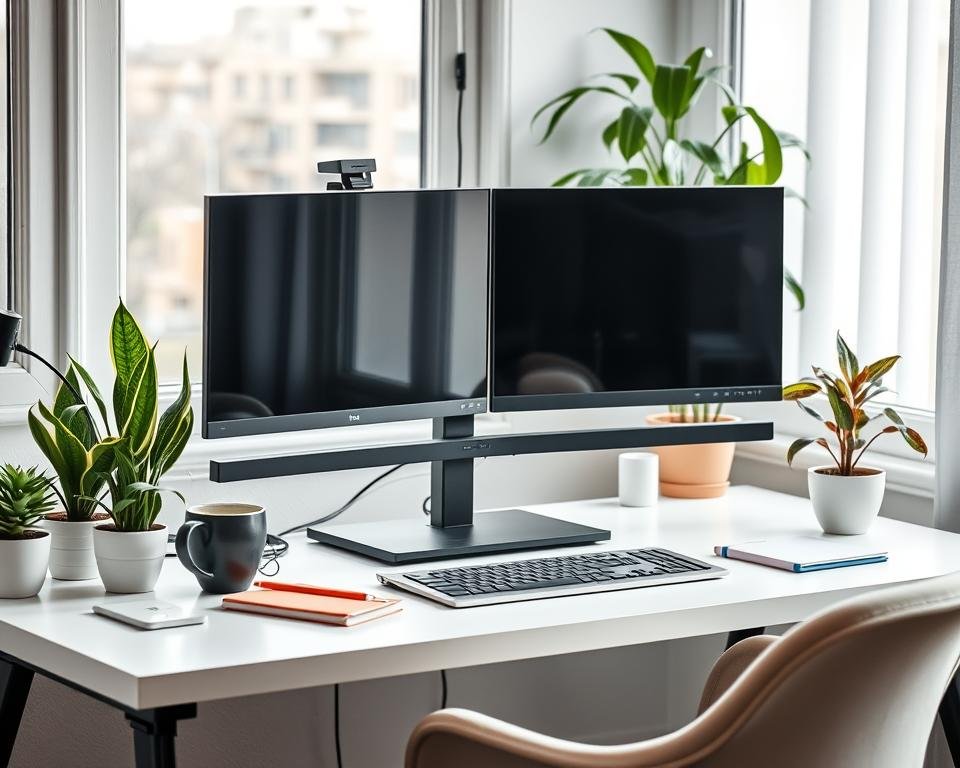
Adding a dual monitor setup to your home office can really help you work better. Most computers and laptops can handle two screens now. This makes it easy to use two monitors and get more done.
Increased Productivity
Using two monitors can make you up to 42% more productive. You can spread out your work on two screens. This means you don’t have to switch between apps as much.
Enhanced Multitasking
Having two monitors lets you do more things at once. You can use two apps at the same time. This is great for people who need to move data between apps easily.
Improved Focus and Organization
Dual monitors also help you stay focused and organized. You can sort tasks on different screens. This makes your work flow better and keeps you from getting distracted.
Choosing the Right Desk for a Dual Monitor Setup
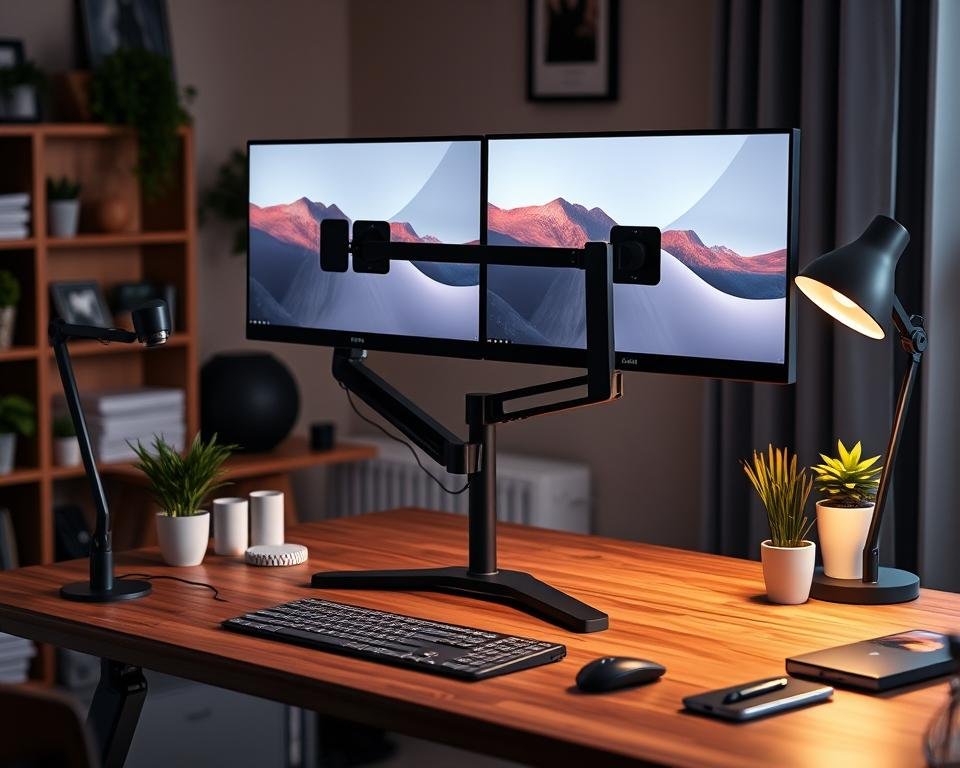
Finding the perfect desk for dual monitors is key for a good home office. You need to think about space, how it’s made, and if it can adjust. These things help you work better and feel comfortable.
Sufficient Surface Area
The desk should fit your monitors, keyboard, and mouse. Look for a desk that’s at least 55 inches wide and 30 inches deep. If you have big monitors, a desk 60 to 72 inches wide is better.
The Fezibo Pro Electric Standing Desk is great for dual monitors. It has lots of space.
Sturdy Construction
The desk must be strong and stable. It needs to hold up to the weight of your monitors and other stuff. Desks like the Bestier Gaming Desk are sturdy and have lots of room for your things.
Choose desks made from solid wood or metal. They support your monitors well.
Adjustable Features
Having a desk that can change is important. Desks that let you switch between sitting and standing are best. They help you stay comfortable and avoid back pain.
Look for desks with monitor arms that move. These arms can turn and tilt, making your workspace better.
In short, the best desk for dual monitors has enough space, is strong, and can adjust. Adding dual monitor stands and organizing your office makes it even better.
Best Monitor Stand Options for Dual Monitors
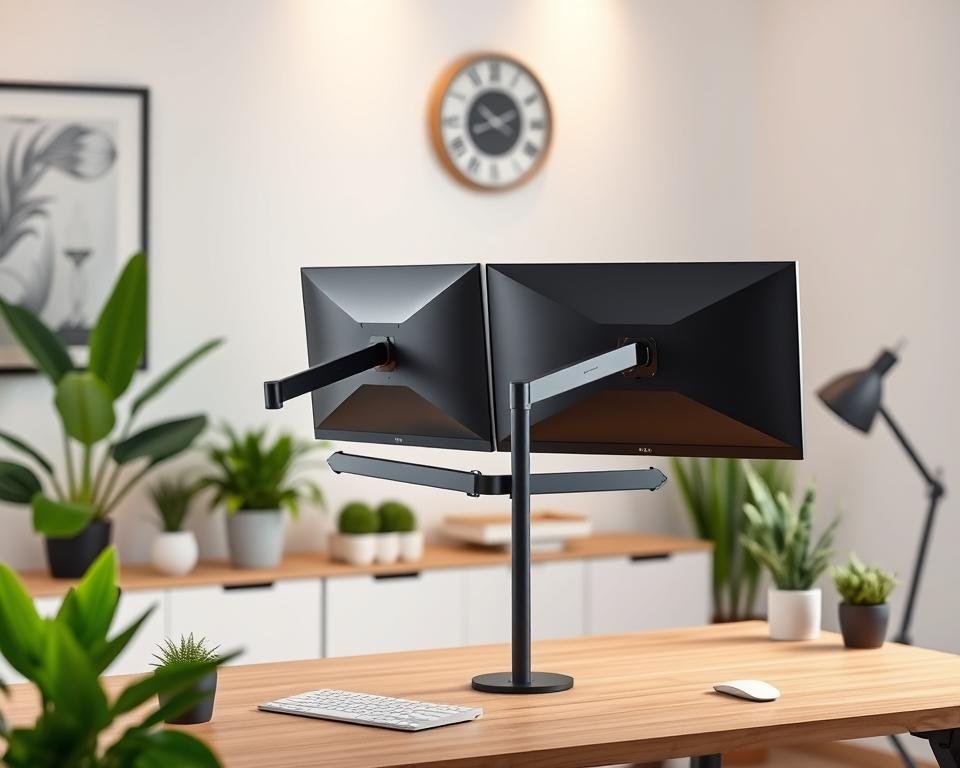
Creating an ergonomic home office setup is key. Dual monitor stands are a must. They keep your screens at eye level, easing neck strain and improving posture. Here are some top monitor stand choices to consider.
Benefits of Using Monitor Stands
Monitor stands offer big ergonomic benefits. They let you adjust screen height and angle. This reduces neck and back stress.
Wirecutter has reviewed monitor arms since 2016. They found adjustable models best for home offices. Dual monitor stands also clear up desk space, making your area more organized.
Top Monitor Stand Choices
Choosing the right monitor stand is crucial. There are many top-rated stands, each with special features. For example, the Jarvis Arm supports big displays up to 32 inches.
The Dual Monitor Desk Mount with Gas Spring Arms is another great option. It holds up to 19.8 pounds per monitor, offering top stability.
For a budget-friendly choice, the Full Motion Dual Monitor Desk Mount is perfect. It fits monitors up to 32 inches and holds up to 22 pounds per monitor. The Dual Arm Monitor Wall Mount is also a good pick for wall setups, supporting up to 14.3 pounds per monitor.
There are 42 dual monitor mount solutions to choose from. They offer features like height adjustability and full-motion articulation. You can find a stand that fits your needs, whether you prefer manual or electric height adjustment.
Ergonomic Practices for a Dual Monitor Setup
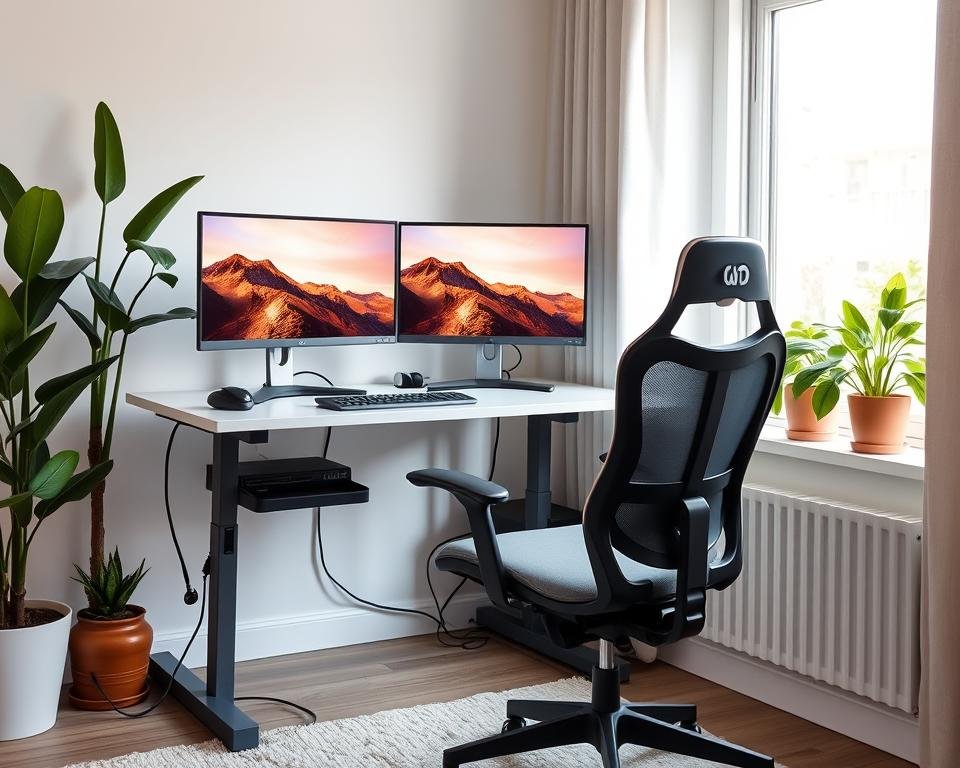
Setting up your home office right is key. Make sure your monitors are at the right height and distance. This helps you work better and stay healthy.
Monitor Placement
A 27-inch monitor should be 3 to 4 feet away. A 32-inch monitor needs about 5 feet. Don’t put your monitor too high or too low.
For a standing desk, the top of the screen should be at the tip of your middle finger. This helps you stay comfortable and productive.
Keyboard and Mouse Placement
Keep your keyboard and mouse close. Place them so your elbows are at 90 degrees. Wrist rests help keep your wrists straight and comfy.
Chair Selection
Choosing the right chair is important. Look for one with lumbar support, adjustable arms, and seat height. This lets you adjust it to fit you, avoiding back pain.
A good ergonomic chair can really improve your workday.
Ideal Viewing Distance for Dual Monitors
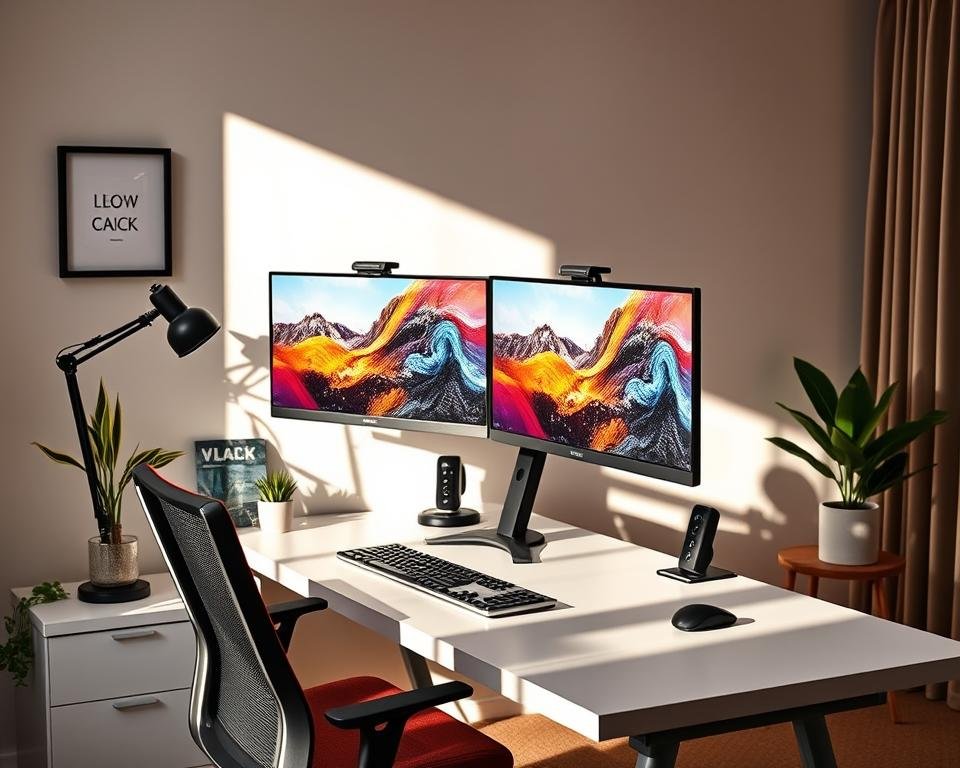
When setting up a home office decor dual monitor workspace, finding the right viewing distance is key. Dual monitors should be about an arm’s length away. This ensures you’re fully immersed without eye strain.
Monitors should be placed 15 degrees below eye level for comfort. The resting point of accommodation (RPA) is around 31.5 inches and grows with age. Make sure monitors are straight in front of you, touching or slightly curved to avoid health issues.
For example, a 27-inch monitor is best at 3 to 4 feet away. A 32-inch monitor is better at 5 feet. This distance reduces eye fatigue, helps you see clearly, and boosts focus.
Also, keep your laptop and monitor screens at the same height. This keeps your head and neck straight, whether you’re standing or sitting. The top of your monitor should line up with the tip of your middle finger when your arm is out.
Integrating Stylish Office Accessories
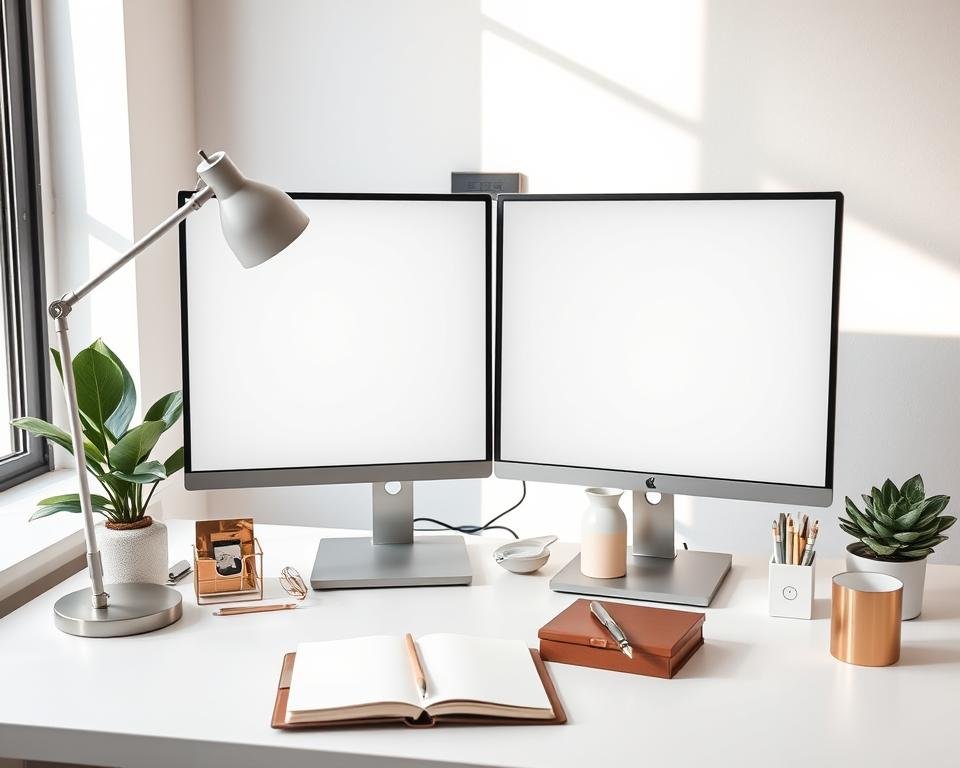
Creating a professional yet personal touch in a home office is important. You need to pick the right stylish office accessories. It’s all about finding the perfect mix of decor and function to boost productivity and make your workspace look great.
Essential Decorative Items
Decorative items can add personality and energy to your home office. Think about getting elegant desk organizers, statement wall art, or a stylish desk lamp. These items not only make your room look better but also help you stay organized.
Adding green elements like small potted plants or a mini succulent garden is also a good idea. It brings a bit of nature into your space.
Blend of Function and Style
The secret to a great home office is finding a balance between function and style. You should have accessories like cable organizers, ergonomic keyboard trays, or monitor stands. They should fit well with your decor and be useful.
Choosing ergonomic chairs or drafting chairs is also smart. They look good and support you during long work hours. This way, you keep your office organized, efficient, and nice to look at.
Using home office decor ideas can also help. Pick a color scheme or theme that shows your style. Whether you like a simple setup or a colorful one, the right accessories can make your office reflect your taste and stay organized.
Effective Cable Management Solutions
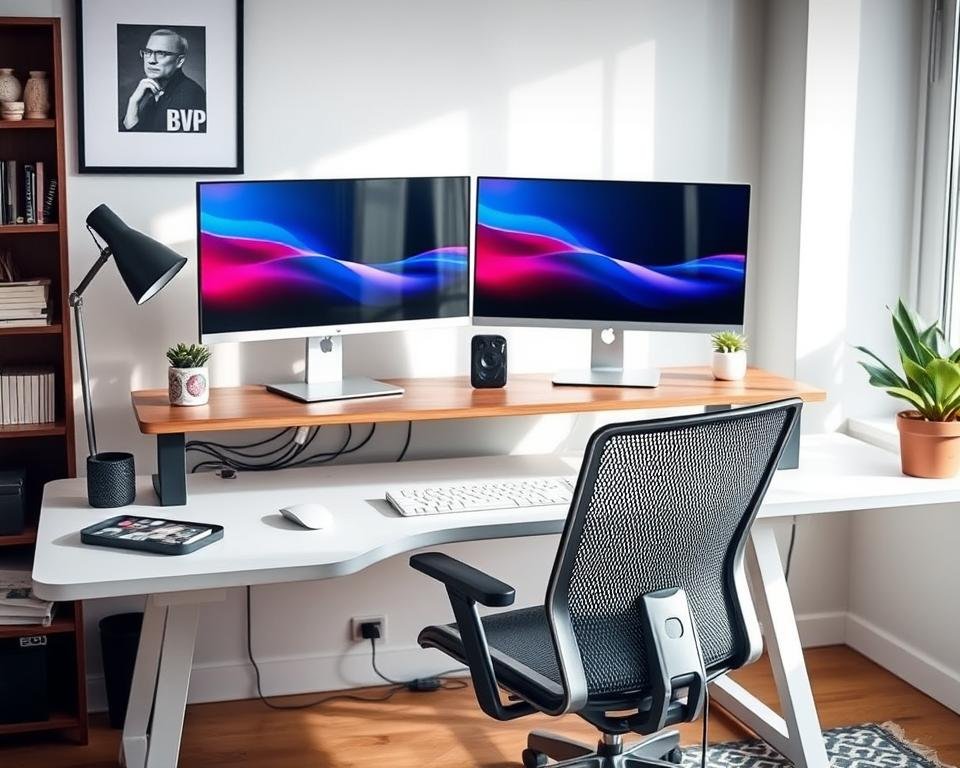
Keeping your workspace tidy is key, especially with a home office decor dual monitor setup. We’ll look at ways to make your space look good and stay focused.
The Hexcal Studio is a top pick, costing $900. It has a 40-inch cord storage chamber. This keeps cables organized. It also has an aluminum desk riser with LED lights and adjustable legs.
Velcro One Wrap reusable straps are great for small cords. They’re tough and can be changed, making them good for the planet.
Cable sleeves and clips help tidy up your desk. A power bar with outlets and USB ports on your desk is handy. Silicone cord protectors keep your furniture safe.
For a clean look, hide cables under a rug. Cut a slit to pass cords through. Use duct tape to protect the rug.
Good cable management is about looks and function. Adding cord trays and organizing small items makes your space both useful and nice to look at.
Dual Curved Monitors vs. Flat Monitors
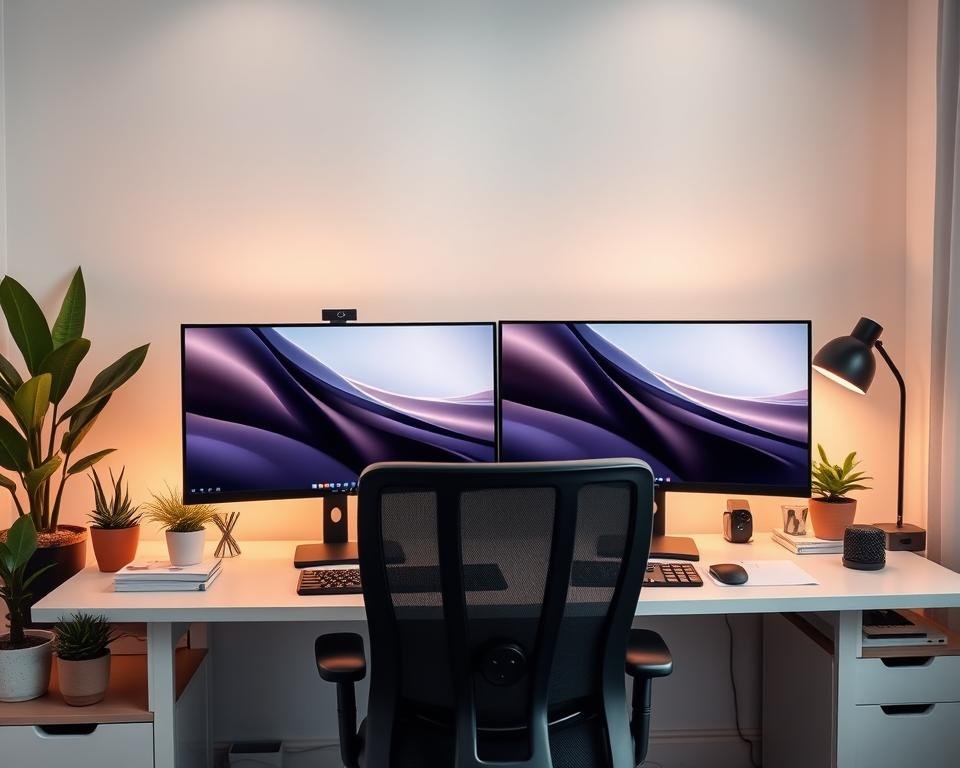
Choosing between curved and flat monitors for your dual setup can be tough. Each has its own good points and not-so-good points. I’ll help you figure out which one is best for your home office.
Pros and Cons of Curved Monitors
Curved monitors are loved for their immersive feel. They fill your view, making games and videos more fun. They also cut down on eye strain because they match the shape of your eyes.
But, curved monitors cost more. They’re bigger and heavier, which makes them pricier and harder to hang. Their unique shape also means you need to set them up just right for the best view.
Comparing Display Quality
Curved monitors usually show colors better than flat ones. Their design makes colors richer and more even. This is great for graphic design and data work, as it lets you see more at once.
Flat monitors, on the other hand, are cheaper and more flexible. They save space and are easy to move around. They’re perfect for coding and programming because they’re clear and easy to read.
When picking monitors for your home office, think about what you need. Do you want a deep, immersive experience or something simple and versatile? The right choice can make a big difference in how you work and feel.
Optimizing Home Office Decor Dual Monitor Setup
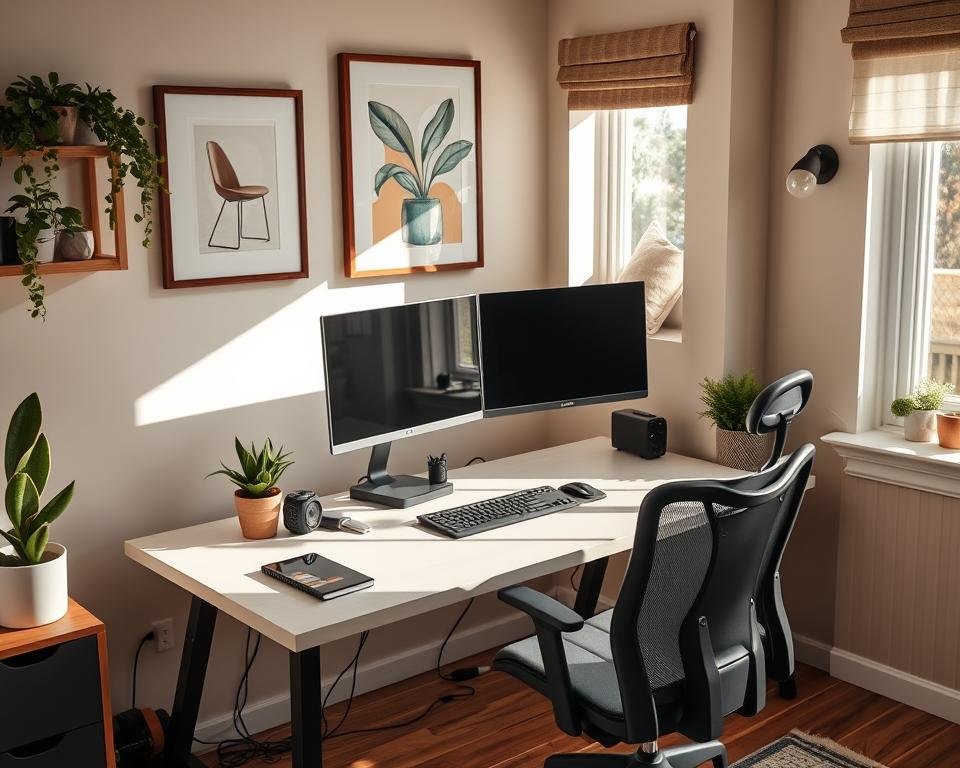
Setting up a home office with dual monitors can make your space better and more stylish. Use dual monitor stands to lift your monitors to eye level. This makes your setup look good and helps avoid neck and shoulder pain.
Adding stylish office accessories can make your office look fancy. Think about getting a sleek keyboard tray, a comfy chair, and nice desk organizers. These items make your office work better and look nicer.
Good cable management is key for a clean desk. Use cable clips and sleeves to keep things tidy. A neat desk looks better and helps you stay focused.
Customizing your display settings is also important. It lets you switch between work modes easily. Make sure your graphic card works well with your setup for smooth performance.
Finally, use anti-glare screens and the right lighting to avoid eye strain. Good lighting and a nice office setup can boost your creativity and work-life balance.
Home Office Organization Solutions

Creating a great home office means using smart ways to organize and decorate. A clean workspace looks good and helps you work better. Here are some easy ways to keep your office neat and nice to look at.
Utilizing Desk Organizers
Desk organizers are a smart choice for a tidy office. The Everything Organizer Monitor Stand with Drawer is a good pick. It raises your monitors and stores things in a drawer.
The Marie Kondo Shoji Bamboo Collator is another great tool. It costs $40 and helps you organize papers neatly. For small things, the Modular Desk Organizer is perfect. It’s on Etsy for $45 and fits pens and clips.
Maximizing Storage Space
Use wall shelves and multi-use furniture to save space. The Acrylic Family Planner is a good choice. It’s $26 on Etsy and saves desk room. Add modular bookshelves or cabinets for more storage.
Don’t forget about cable management. The Function 101 Cable Blocks are $28 at West Elm. They keep wires tidy. For charging devices, the MAG:2 ESSENTIALS wireless charger is $80.
For more ideas, check out these stylish home office decor ideas. Clearing out clutter and using smart storage makes your office better. It will be both useful and pretty.
Vertical Monitor Setup: A Stylish Alternative
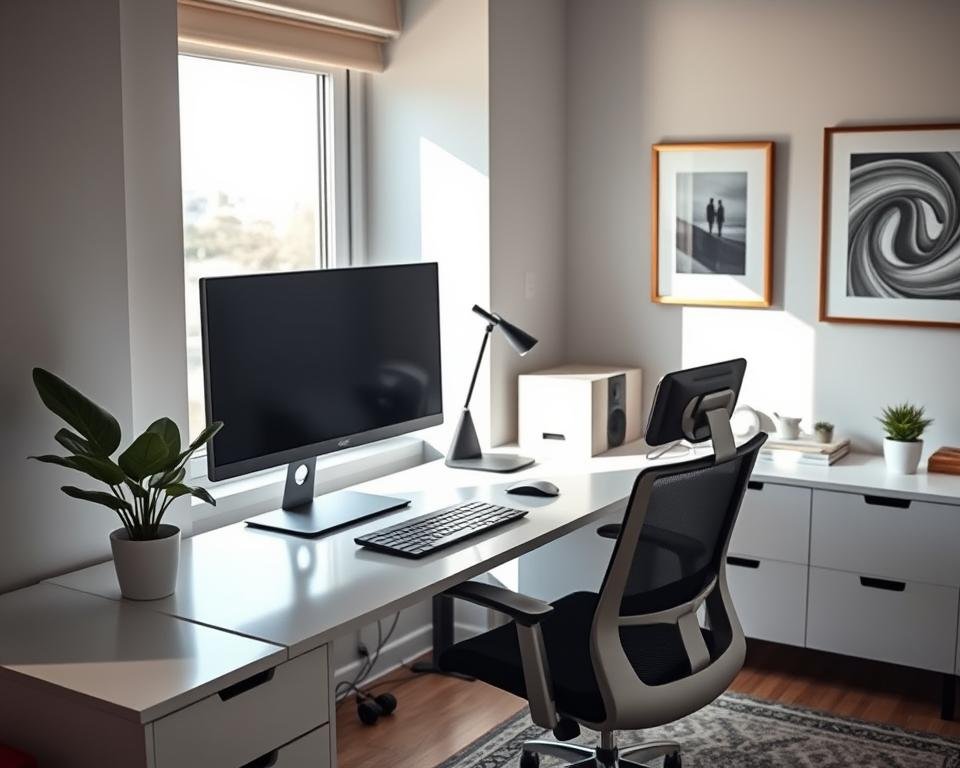
Setting up a vertical monitor is stylish and practical for your home office. I’ve worked at a desk for 25 years. The vertical monitor setup is unique and beneficial.
Advantages of Vertical Monitors
Vertical monitors are great for coders and writers. They help you see more without scrolling. This makes you more productive.
Working long hours, I found vertical monitors reduce mouse movement. Most modern monitors can rotate. This makes it easy to follow ergonomic guidelines.
Using a vertical monitor also reduces neck strain. It’s good for your health. Plus, you can use HDMI, DisplayPort, and USB-C for high-quality screens.
Programmers love vertical monitors because they show more code. Using two vertical monitors is even better for coding or writing.
How to Set Up Vertical Monitors
Start by making sure your desk is big enough for multiple screens. Check out our home office decor dual monitor guide. Choose strong monitor stands that adjust well.
I like using a 34-inch curved monitor and a 27-inch screen in portrait. Adjust your display settings for the best view. This might take some tweaking, but it’s worth it.
Vertical monitors make your workspace better. They help you work more efficiently and stay healthy. It’s a smart choice for your home office.
Advantages of Dual Ultrawide Monitors
Switching to dual ultrawide monitors can change your home office. Traditional setups have two monitors with a 16:9 ratio. Ultrawide monitors have a 21:9 ratio, giving you a wider view for work or fun.
Enhanced Immersive Experience
Ultrawide monitors have a 21:9 ratio, like movies. They offer a deep movie-watching experience. Models like the Samsung Odyssey G5 or Alienware AW3423DW have curved screens.
This makes watching movies or playing games better. It feels more real and comfortable.
Increased Work Efficiency
Ultrawide monitors make your workspace better. They have no bezel gap, unlike dual monitors. This is great for big spreadsheets or graphic design.
Features like Windows Snap and FancyZones help you work better. They make your setup look good and work well.
Ultrawide monitors cost more, like the LG 49GR85DC-B and Samsung Odyssey OLED G9. But they make your workspace better. They are a good choice for a productive and fun setup.
FAQ
How does a dual monitor setup improve productivity?
What are the ergonomic benefits of using dual monitor stands?
What should I consider when choosing a desk for my dual monitor setup?
What are some essential ergonomic practices for a dual monitor setup?
How can I manage cables effectively in my home office?
What are the pros and cons of using curved monitors for a dual setup?
How can I integrate stylish office accessories into my dual monitor setup?
What are the benefits of a vertical monitor setup?
What are the advantages of using dual ultrawide monitors?


